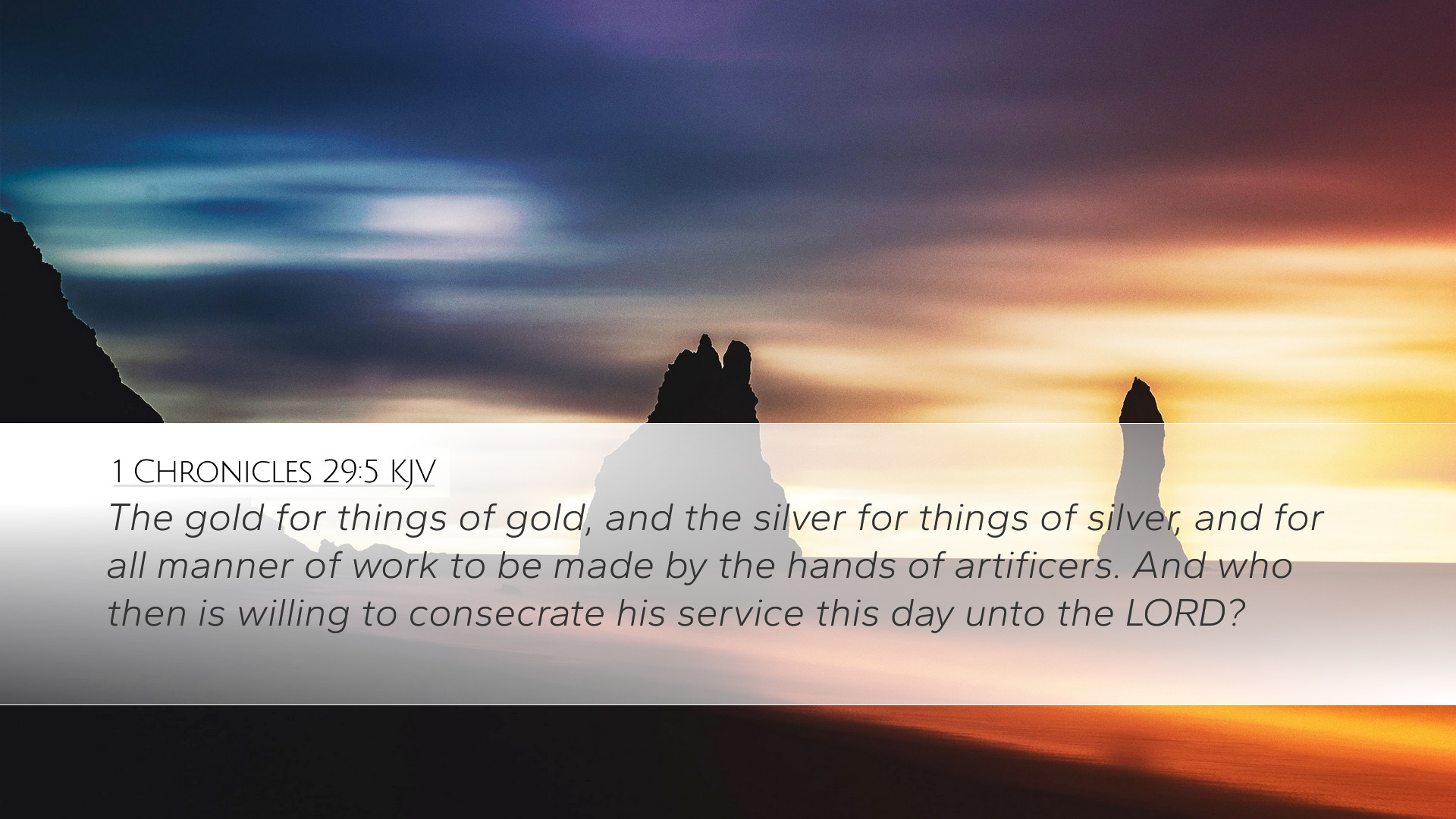Commentary on 1 Chronicles 29:5
Verse Context: 1 Chronicles 29:5 states, "Of gold for things of gold, and of silver for things of silver, and for all manner of work to be made by the hands of artisans. And who then is willing to consecrate himself this day to the LORD?" This passage is part of David's final address to the people of Israel as he prepares for the temple construction and encourages them to give generously for the project.
Historical Background
The book of Chronicles serves to recount the history of Israel, emphasizing the significance of the Davidic line and the worship at the temple in Jerusalem. As David approaches the end of his reign, he seeks to establish a lasting legacy through the building of the temple, a central place of worship for the Israelites. His call to the people reflects a critical moment in Israel's history as they transition into a new era of worship.
Theological Insights
This verse highlights several key theological themes:
- Stewardship and Generosity: David's appeal to the people emphasizes the importance of being stewards of the resources that God has provided. The delineation of gold and silver signifies the value and beauty of the materials devoted to God’s house.
- Willingness to Serve: The phrase "who then is willing" indicates that contribution to God's work should be voluntary and stem from a heart dedicated to serving Him. This call for willing hearts resonates throughout Scripture, reiterating that God desires heartfelt service over mere obligation.
- Consecration: The invitation to "consecrate himself" invites the people to set themselves apart for God's purpose. This reflects both a physical and spiritual dedication to the work of the temple.
Commentary Highlights
Matthew Henry's Commentary
Matthew Henry notes that this request for resources is not just about material contributions but also about the spiritual condition of the ones providing. He posits that God expects His people to engage in His work willingly and with their whole hearts. Henry also emphasizes that the call for self-consecration aligns with a greater scriptural narrative where God desires His people to be sanctified for His service.
Albert Barnes' Notes on the Bible
Albert Barnes elaborates on the organized approach David takes in his appeal, which demonstrates effective leadership. He underscores that the specific mention of gold and silver correlates to the opulence that was fitting for the temple of the Almighty God. Barnes also draws attention to the significance of individual willingness to participate in the Lord's work, suggesting that such involvement brings believers into deeper communion with God’s purposes.
Adam Clarke's Commentary
Adam Clarke provides practical insight into the nature of giving in the context of service to God. He asserts that the contribution is an act of faith, a manifestation of trust in God’s provision. Clarke highlights that the notion of consecration reflects the covenant relationship between God and His people; through their actions, they affirm their allegiance and dedication to Him. He also references historical practices of sacrificial giving throughout the Old Testament, linking them back to the individual's intent and relationship with God.
Applications for Today's Believers
From this verse, several practical applications can be drawn for pastors, students, theologians, and Bible scholars:
- Emphasizing Generosity: Teaching congregations about the importance of generosity in serving the church and the community mirrors David’s call. It encourages believers to see their resources as tools for God’s mission.
- Willing Hearts: Encouraging a culture of willing service rather than obligatory participation in church activities fosters a deeper relational aspect of faith. Individuals are urged to reflect on their motivations for serving.
- Personal Consecration: Leaders can inspire their congregations to continually seek personal renewal and consecration, reminding them that God's work is facilitated through those who actively dedicate themselves to His service.
Conclusion
1 Chronicles 29:5 encapsulates profound principles of stewardship, generosity, and call to consecration that resonates deeply across generations. David’s example offers a framework for understanding the role of individual contributions within the broader narrative of God’s work. For pastors and theologians, this passage serves not only as a historical account but also as an enduring call to engage in meaningful service to God and His kingdom.


